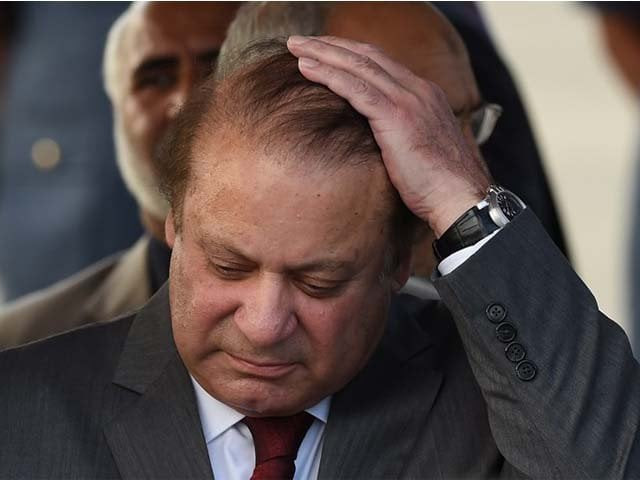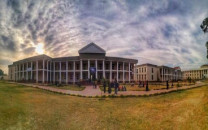Court seeks third extension as deadline to conclude references against Sharif family ends
SC takes up accountability court’s judges request today at Lahore registry

Deposed prime minister Nawaz Sharif. PHOTO: AFP/FILE
A special bench – comprising Chief Justice of Pakistan Mian Saqib Nisar and Justice Ijazul Ahsan – is set to hear the application filed by Accountability Court Judge Muhammad Bashir after the deadline for concluding proceedings in the graft references lapsed on Saturday.
The accountability court hearing the corruption references has sought a third extension from the apex court. Earlier in March, the SC granted a two-month extension to the accountability court to wrap up the proceedings. When the references could not be completed in the stipulated time, the SC granted one month more to decide the references but it could not happen despite marathon day-to-day hearings.
Court restricts Nawaz, Maryam from visiting ailing Kulsoom
Interestingly, both SC judges – Justice Sheikh Azmat Saeed and Justice Ijaz ul Ahsan – who had heard the trial court’s application last time are not available at the Islamabad registry next week.
However, the SC cause list has revealed that the matter is fixed for hearing at Lahore registry on Sunday. Earlier, legal experts were expressing concerns about Monday’s hearing in accountability court as the SC’s cause list for Islamabad registry did not mention the case for Sunday or Monday.
On Monday, the accountability court is set to witness cross-examination of the NAB’s key witness, Wajid Zia, in Al-Azizia & Hill Metal Establishment reference.
The accountability court fixed Avenfield reference for Tuesday after NAB Deputy Prosecutor General Sardar Muzaffar Abbasi concluded his arguments on Friday. Defence counsel Khawaja Haris and Amjad Pervaiz are now expected to present final arguments in the Avenfield reference.
Once the statements are recorded, defence counsel Khawaja Haris would cross-examine the witnesses. Subsequently, the accused standing trial would record statement in the references and produce witness in defence, if needed, and after that the NAB and defence counsel would present arguments in the cases.
Following the arguments, both the parties would give rebuttal and then the court is expected to reserve verdict or go for pronouncement of judgment.
Sharif approaches IHC
Meanwhile, former PM Nawaz Sharif has approached the Islamabad High Court (IHC) and challenged an order of the accountability court which held that the reason for rendering the decision simultaneously in all the three references is ‘not existing at present’.
Apparently deviating from its earlier stance that all three NAB references against the Sharif family would be decided simultaneously, the accountability court said on June 5 no such reason existed now.
“Accused has not produced any defence witness in this [Avenfield] reference. He has also not opted to be examined on oath under section 340 (2) CrPC. Therefore, the reason for rendering the decision simultaneously in all the three references in not existing at present,” Judge Bashir stated in the order.
Subsequently, the accountability court dismissed Sharif’s request to postpone final arguments till evidence is recorded in all three references.
‘Unknown forces’ operating in the country, says Nawaz after journalists harassed
According to Sharif’s counsel, if the accountability court decided one of the three references separately and independently of the other two, the judge would disclose his mind with respect not only to the accused who is common in all references but also in respect of the facts which are also common to all three cases.
“Consequently, the other two references would inevitably have to be transferred to and decided by one or more judges who would be totally unfamiliar with the detailed facts and propositions of law involved in the cases,” he added.



















COMMENTS
Comments are moderated and generally will be posted if they are on-topic and not abusive.
For more information, please see our Comments FAQ